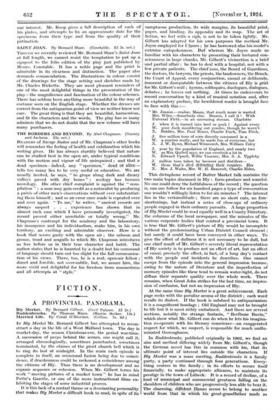READERS of Savage Sudan and of Mr. Chapman's other books
will remember the feeling of health and exhilaration which his writing gives. He has always sturdily believed that nature can be studied best in the open air, under typical conditions with the motion and vigour of life unimpaired ; and that a dead specimen—indeed, any " specimen," dead or alive— tells too many lies to be very useful or educative. We are usually invited, he says, " to grope along dark and dreary valleys paved with dry bones " ; zoology has become necrology. His other chief complaint is against the com- pilation " : a man may gain credit as a naturalist by producing a precis of other men's observations without ever substantiat- ing them himself ; and so an error once made is repeated over and over again. " To me," he writes, " ancient records are always suspect . . . experience has shown that in almost each ease which I have personally investigated, the record proved either unreliable or totally wrong." Mr. Chapman's contempt for the academy and the laboratory, his insurgence and his individualism, make him, in his own territory, an exciting and admirable observer. Here is a book that seems gusty with the open air ; the salmon and grouse, trout and seagulls to which Mr. Chapman introduces us live before us in their true character and habit. The author states that he is haunted by a doubt lest his command of language should turn out too slight for the full communica- tion of his views. There, too, he is a real, open-air fellow ; direct and forcible, not over-subtle, but, we assure him, the more vivid and delightful for his freedom from mannerisms and all attempts at " style."










































 Previous page
Previous page